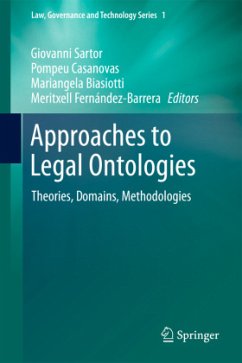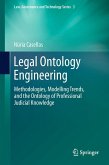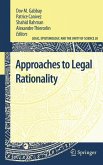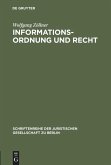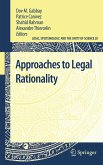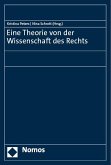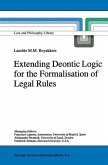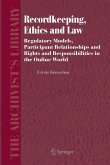Approaches to Legal Ontologies
Theories, Domains, Methodologies
Herausgegeben:Sartor, Giovanni; Casanovas, Pompeu; Biasiotti, Mariangela; Fernández-Barrera, Meritxell
Approaches to Legal Ontologies
Theories, Domains, Methodologies
Herausgegeben:Sartor, Giovanni; Casanovas, Pompeu; Biasiotti, Mariangela; Fernández-Barrera, Meritxell
- Broschiertes Buch
- Merkliste
- Auf die Merkliste
- Bewerten Bewerten
- Teilen
- Produkt teilen
- Produkterinnerung
- Produkterinnerung
The book provides the reader with a unique source regarding the current theoretical landscape in legal ontology engineering as well as on foreseeable future trends for the definition of conceptual structures to enhance the automatic processing and retrieval of legal information in the Semantic Web framework. It will thus interest researchers in the domains of the SW, legal informatics, Artificial Intelligence and law, legal theory and legal philosophy, as well as developers of e-government applications based on the intelligent management of legal or public information to provide both back-office and front-office support.…mehr
Andere Kunden interessierten sich auch für
![Legal Ontology Engineering Legal Ontology Engineering]() Núria CasellasLegal Ontology Engineering127,99 €
Núria CasellasLegal Ontology Engineering127,99 €![Approaches to Legal Rationality Approaches to Legal Rationality]() Approaches to Legal Rationality127,99 €
Approaches to Legal Rationality127,99 €![Informationsordnung und Recht Informationsordnung und Recht]() Wolfgang ZöllnerInformationsordnung und Recht19,95 €
Wolfgang ZöllnerInformationsordnung und Recht19,95 €![Approaches to Legal Rationality Approaches to Legal Rationality]() Approaches to Legal Rationality127,99 €
Approaches to Legal Rationality127,99 €![Eine Theorie von der Wissenschaft des Rechts Eine Theorie von der Wissenschaft des Rechts]() Eine Theorie von der Wissenschaft des Rechts64,00 €
Eine Theorie von der Wissenschaft des Rechts64,00 €![Extending Deontic Logic for the Formalisation of Legal Rules Extending Deontic Logic for the Formalisation of Legal Rules]() Lambèr RoyakkersExtending Deontic Logic for the Formalisation of Legal Rules119,99 €
Lambèr RoyakkersExtending Deontic Logic for the Formalisation of Legal Rules119,99 €![Recordkeeping, Ethics and Law Recordkeeping, Ethics and Law]() Livia IacovinoRecordkeeping, Ethics and Law177,99 €
Livia IacovinoRecordkeeping, Ethics and Law177,99 €-
-
-
The book provides the reader with a unique source regarding the current theoretical landscape in legal ontology engineering as well as on foreseeable future trends for the definition of conceptual structures to enhance the automatic processing and retrieval of legal information in the Semantic Web framework. It will thus interest researchers in the domains of the SW, legal informatics, Artificial Intelligence and law, legal theory and legal philosophy, as well as developers of e-government applications based on the intelligent management of legal or public information to provide both back-office and front-office support.
Produktdetails
- Produktdetails
- Law, Governance and Technology Series 1
- Verlag: Springer / Springer Netherlands
- Artikelnr. des Verlages: 978-94-007-3475-3
- Repr. d. Ausg. v. 2011
- Seitenzahl: 296
- Erscheinungstermin: 27. Januar 2013
- Englisch
- Abmessung: 235mm x 155mm x 17mm
- Gewicht: 453g
- ISBN-13: 9789400734753
- ISBN-10: 9400734751
- Artikelnr.: 37057269
- Herstellerkennzeichnung Die Herstellerinformationen sind derzeit nicht verfügbar.
- Law, Governance and Technology Series 1
- Verlag: Springer / Springer Netherlands
- Artikelnr. des Verlages: 978-94-007-3475-3
- Repr. d. Ausg. v. 2011
- Seitenzahl: 296
- Erscheinungstermin: 27. Januar 2013
- Englisch
- Abmessung: 235mm x 155mm x 17mm
- Gewicht: 453g
- ISBN-13: 9789400734753
- ISBN-10: 9400734751
- Artikelnr.: 37057269
- Herstellerkennzeichnung Die Herstellerinformationen sind derzeit nicht verfügbar.
Giovanni Sartor is Marie-Curie Professor of Legal Informatics and Legal Theory at the European University Institute of Florence and Professor of Computer and Law at the University of Bologna (Italy), after obtaining a PhD at the European University Institute (Florence), working at the Court of Justice of the European Union (Luxembourg), being a researcher at the Italian National Council of Research (ITTIG, Florence), and holding the chair in Jurisprudence at Queen s University of Belfast (where he now is honorary professor). He is author of ten books and has published widely in legal philosophy and legal theory, legal informatics (artificial intelligence and law), computational logic, legislation technique, and computer law.
Foreword; Pompeu Casanovas, Giovanni Sartor.- Preface; Barry Smith.- 1 Introduction. Theory and Methodology in Legal Ontology Engi-neering: Experiences and Future Directions; Pompeu Casanovas, Giovanni Sartor, Maria Angela Biasiotti, Meritxell Fernández-Barrera.- 2 The Legal Theory Perspective: Doctrinal Conceptual Systems vs. Computational Ontologies; Meritxell Fernández-Barrera, Giovanni Sartor.- 3 Empirically Grounded Development of Legal Ontologies: a Socio-Legal Perspective; Pompeu Casanovas, Núria Casellas, Joan-Josep Vallbé.- 4 A Cognitive Science Perspective on Legal Ontologies; Joost Breuker, Rinke Hoekstra.- 5 Social Ontology and Documentality; Maurizio Ferraris.- 6 The Case-Based Reasoning Approach: Ontologies for Analogical Legal Argument; Kevin D. Ashley.- 7 A Complex-System Approach: Legal Knowledge, Ontology, In-formation and Networks; Pierre Mazzega, Danièle Bourcier, Paul Bourgine, Nadia Nadah, Romain Boulet.- 8 The Multi-layered Legal Information Perspective; Guido Boella, Piercarlo Rossi.- 9 Legal Ontologies: the Linguistic Perspective; Maria Angela Biasiotti, Daniela Tiscornia.- 10 A Legal Document Ontology: the Missing Layer in Legal Docu-ment Modelling; Monica Palmirani, Luca Cervone, Fabio Vitali.- 11 From Thesaurus towards Ontologies in Large Legal Databases; Ángel Sancho Ferrer, Carlos Fernández Hernández, José Manuel Mateo Rivero.- 12 The Computational Ontology Perspective: Design Patterns for Web Ontologies; Aldo Gangemi, Valentina Presutti, Eva Blomqvist.- 13 A Learning Approach for Knowledge Acquisition in the Legal Domain; Enrico Francesconi.- 14 Towards an Ontological Foundation for Services Science: the Legal Perspective; Roberta Ferrario, Nicola Guarino, Meritxell Fernández-Barrera.- 15 Legal Multimedia Ontologies and Semantic Annotation for Search and Retrieval; Jorge González-Conejero.- Index.
Foreword; Pompeu Casanovas, Giovanni Sartor.- Preface; Barry Smith.- 1 Introduction. Theory and Methodology in Legal Ontology Engi-neering: Experiences and Future Directions; Pompeu Casanovas, Giovanni Sartor, Maria Angela Biasiotti, Meritxell Fernández-Barrera.- 2 The Legal Theory Perspective: Doctrinal Conceptual Systems vs. Computational Ontologies; Meritxell Fernández-Barrera, Giovanni Sartor.- 3 Empirically Grounded Development of Legal Ontologies: a Socio-Legal Perspective; Pompeu Casanovas, Núria Casellas, Joan-Josep Vallbé.- 4 A Cognitive Science Perspective on Legal Ontologies; Joost Breuker, Rinke Hoekstra.- 5 Social Ontology and Documentality; Maurizio Ferraris.- 6 The Case-Based Reasoning Approach: Ontologies for Analogical Legal Argument; Kevin D. Ashley.- 7 A Complex-System Approach: Legal Knowledge, Ontology, In-formation and Networks; Pierre Mazzega, Danièle Bourcier, Paul Bourgine, Nadia Nadah, Romain Boulet.- 8 The Multi-layered Legal Information Perspective; Guido Boella, Piercarlo Rossi.- 9 Legal Ontologies: the Linguistic Perspective; Maria Angela Biasiotti, Daniela Tiscornia.- 10 A Legal Document Ontology: the Missing Layer in Legal Docu-ment Modelling; Monica Palmirani, Luca Cervone, Fabio Vitali.- 11 From Thesaurus towards Ontologies in Large Legal Databases; Ángel Sancho Ferrer, Carlos Fernández Hernández, José Manuel Mateo Rivero.- 12 The Computational Ontology Perspective: Design Patterns for Web Ontologies; Aldo Gangemi, Valentina Presutti, Eva Blomqvist.- 13 A Learning Approach for Knowledge Acquisition in the Legal Domain; Enrico Francesconi.- 14 Towards an Ontological Foundation for Services Science: the Legal Perspective; Roberta Ferrario, Nicola Guarino, Meritxell Fernández-Barrera.- 15 Legal Multimedia Ontologies and Semantic Annotation for Search and Retrieval; Jorge González-Conejero.- Index.

